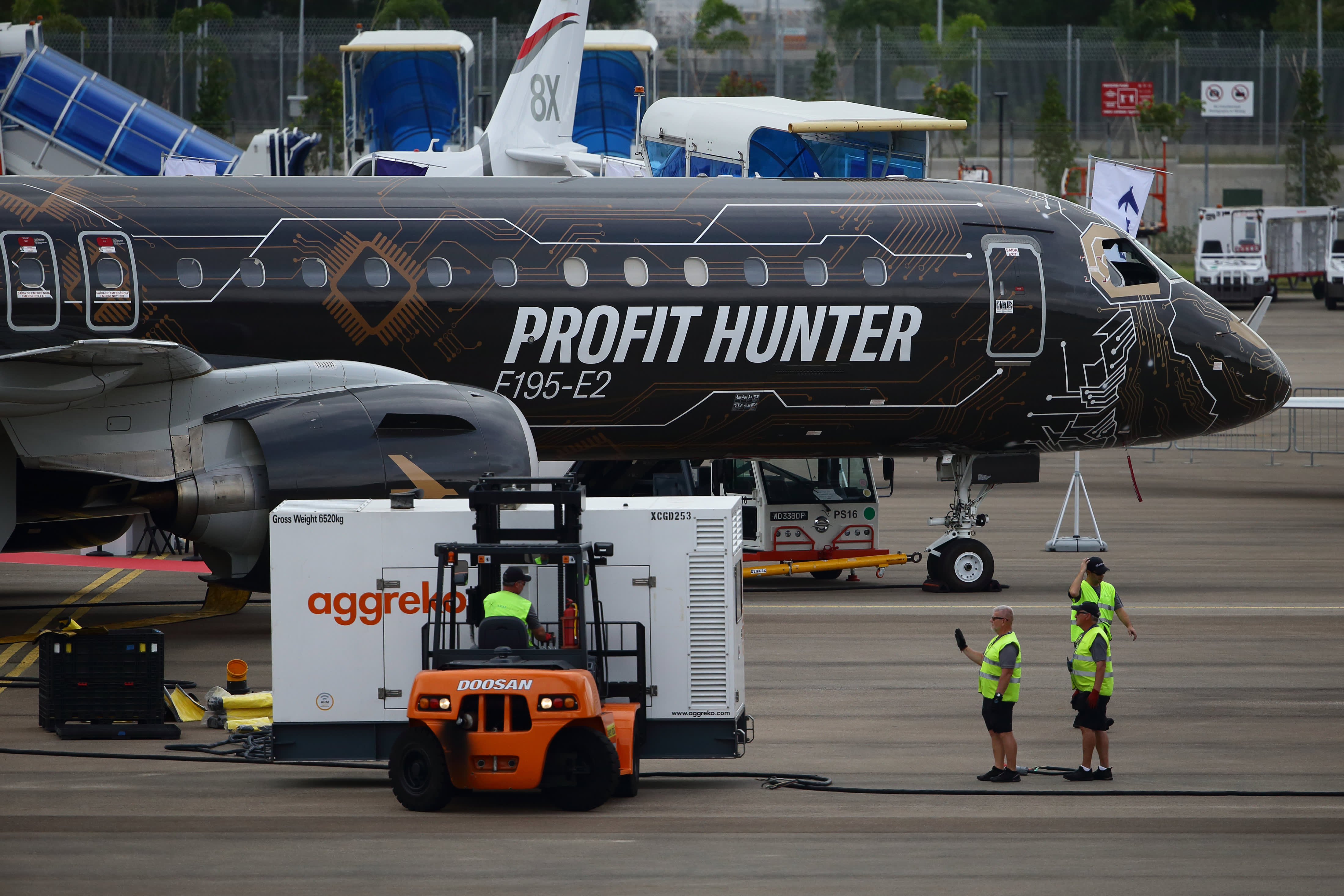
Embraer’s Profit Hunter aircraft, the E195-E2 is seen during the Singapore Airshow media preview on February 9, 2020 in Singapore.
Suhaimi Abdullah | Getty Images
Embraer will likely have a “huge opportunity” in the Asia-Pacific aviation market in the coming years, according to the president and CEO of the Brazilian plane-maker’s commercial aviation division.
That would come largely as airlines seek to service routes beyond major cosmopolitan areas that have previously fueled “explosive growth” in the Asia-Pacific region over the last few decades, Embraer’s John Slattery told CNBC’s “Squawk Box” on Monday.
“For airlines to start serving the secondary, tertiary and fourth-tier markets with frequency, they cannot do that with (Boeing) 737s and (Airbus) A320s because the trip cost is too high,” Slattery said, in reference to popular models by its American and European peers. “They have to right-size their aircraft.”
This, he said, will require a business model that will “run in parallel” to the incumbent strategy of airlines across the spectrum, from low cost to network carriers.
“Over the course of the next 20 years, almost 3,000 aircraft are going to be delivered in this region below 150 seats,” Slattery said.
“We own 35% of the market share today, at Embraer, we’re the market share leader (of planes) below 150 seats,” he said. “We want our fair share of that wallet size of the opportunity going forward.”
Coronavirus impact on APAC’s air traffic growth
The Embraer executive’s enthusiasm comes despite challenges for the aviation industry as it grapples with the coronavirus outbreak that has already taken a toll on the sector.
Multiple countries have restricted travel from China, where the disease was first reported in the city of Wuhan.
Slattery acknowledged that the virus will “have a very meaningful impact” on air traffic growth rates in Asia-Pacific for 2020, with China today accounting for 16% of global capacity.
“After the virus broke, we’re seeing a pulldown on scheduled operations into China going down … by 25%,” Slattery said. “In actual fact, that’s not keeping up with the actual operations that airlines are doing, which is a reduction of 50%.”
“The (International Air Transport Association) gave an original assessment for the Asia-Pacific growth, 4.7% in 2020,” Slattery said. “The pundits are suggesting as a direct result of the virus that could now materialize somewhere in the minus 2% to minus 6% or even minus 8%, which is extraordinary.”
He remained positive, however, despite the obstacles the sector faces.
“When we look at the previous situations, SARS being the best example, the economies tend to bounce back relatively quickly after you’ve seen a peak in the penetration in the region,” Slattery said.
On 737 Max safety woes
Commenting on Boeing’s well-documented troubles with its 737 Max, which have been grounded for months following two fatal crashes, Slattery expressed confidence that the jetliner will be “back up in the air.”
In January, Boeing suspended production of the 737 Max. The company has been impaired by the crisis and is struggling to regain public and regulators’ confidence after the fatal crashes and troves of emails showing its own employees boasted about bullying regulators, while others expressed worries over what they described as lax safety standards.
Asked if Boeing’s troubles over the 737 Max served as any consolation for Embraer, Slattery said: “Any OEM CEO that would be sitting here with you would share the following: We’re not here to compete on safety issues.”
“I think Airbus would join me, and indeed all the other OEMs, Comac in China and Sukhoi and the others in Russia in wishing Boeing the best to get the Max recertified,” he said. “It’s important in our industry that there is confidence amongst the flying public.”
—CNBC’s Leslie Josephs contributed to this report.
Source: Business - cnbc.com



